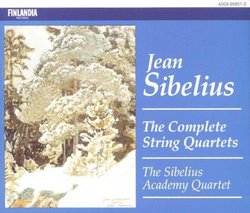| All Artists: Jean Sibelius, Sibelius Academy Quartet Title: Sibelius: Complete String Quartets (Box Set) Members Wishing: 0 Total Copies: 0 Label: Finlandia Release Date: 8/30/1994 Genre: Classical Style: Chamber Music Number of Discs: 2 SwapaCD Credits: 2 UPC: 745099585129 |
Search - Jean Sibelius, Sibelius Academy Quartet :: Sibelius: Complete String Quartets (Box Set)
 | Jean Sibelius, Sibelius Academy Quartet Sibelius: Complete String Quartets (Box Set) Genre: Classical
|
Larger Image |
CD Details |
CD ReviewsHe wasn't just a symphonist Steve Johnson | Los Angeles, CA USA | 04/06/2003 (5 out of 5 stars) "Jean Sibelius is famous primarily for his symphonies and symphonic poems. In the realm of chamber music, he is represented by the string quartet in D minor (subtitled "Voces Intimae"), which he wrote during his mature period. Among the lesser known aspects of his musical output are three quartets which preceded it. The first quartet (in E flat) was written by Sibelius at the age of 20 in 1885. It is clearly a student work, with a Haydnesque quality, and unremarkable except for occassional flashes of the distinctive musical voice the composer was to develop. But if the E flat quartet is the work of a student, and "Voces Intimae" is one of a master, then the real surprise comes with the second and third quartets.The A minor string quartet was composed a scant four years after the E flat quartet, yet it reveals a very different - and more unique musical world. While the form of each movement is rather textbook, the flow of ideas and harmonic inventiveness are truly remarkable. This quartet also reflects Sibelius' early interest in counterpoint with fugato sections in both the first and fourth movements, although these sections are by no means mere dry academic exercises! Except for the middle section of the second movement, which can be recognized as being very Sibelian, the originality of the musical language in the A minor quartet is unusual compared to that of the composer's later work. It is a haunting piece from beginning to end, and one very much worth getting to know.The B flat quartet, composed one year after the A minor quartet, shares two things in common with it - the form is rather textbook, but quality of the material is remarkable. In contrast to the earlier quartet, the first movement is calmer and rather pastoral. However, there are elements more distinctly recognizable as being from the pen of Sibelius, with occassoinal flashes of harmony suggestive of Debussy or Ravel. Although the melodic aspects of Sibelius' music are described as being folk-like, he rarely quoted actual Finnish folk songs. The second movement of the B flat quartet is one of those rare occasions, where he uses the quotation as the basis for a set of variations. The odd harmonic shifts underpinning the statement of the "theme" set the tone for the entire movement, and one variation in particular borders on the hallucinatory. The third movement is an athletic scherzo with a brief moment of melancholy that expresses itself fully only in the trio section, which like the middle section of the A minor quartet's second movement, is distinctly Sibelian. The fourth movement begins with a vigorous theme that foreshadows the finale of Sibelius' violin concerto (there is a similar foreshadowing in the first movement of the B flat quartet with that of the violin concerto). As it proceeds, the assertiveness of ideas are interspersed with moments of genuine (and surprising) warmth. Sibelius wrote the D minor quartet ("Voces Intimae")in 1909, between his Third and Fourth symphonies. Much has been made about this in musical commentary, but it misses the point that Sibelius had a different way of expressing himself away from his usual symphonic idiom. While his approach to form in this quartet is more in keeping with his orchestral music, the expression is (as the subtitle suggests) more intimate. The promise suggested by the A minor and B flat quartets is fully revealed here, and offers proof that it is truly a loss to the musical world that Sibelius did not choose to pursue a line of musical development in which he clearly had a great deal of skill.The Sibelius Academy Quartet provides a strong, committed and deeply sympathetic performance of these pieces. It also suggests that the A minor and B flat quartets deserve better recognition alongside "Voces Intimae" in the repertoire. For devotees of string quartets in general, or the music of Sibelius in particular, I highly recommend this recording."
|

 Track Listings (8) - Disc #1
Track Listings (8) - Disc #1